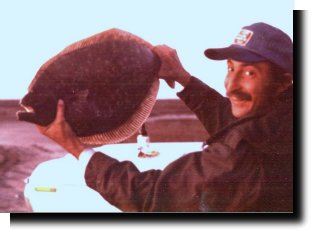|
Catching
Flounder at Matagorda
-
The Best Places
to Fish: The best areas are the coves and flats areas
near major passes. Some of the better known spots include the mouth of the Colorado
River at the Jetties, the locks at the Colorado River and the Intracoastal
waterway at Matagorda, the diversion channel where the "new"
Colorado river flows into West Matagorda Bay, Old Gulf cut between
the intracoastal canal and East Matagorda Bay, simular passes from
East Matagorda Bay into the intracoastal canal towards the Sargent
area. There is a really good cut into the Gulf just west of Sargent,
accessible from the beach with 4x4, that is a hot spot in the fall....In
West Matagorda Bay, the old river cut, the cut at Mad Island from
the bay to the canal, Oyster Lake and Pass Cavallo at Port O'Connor.
Some of the better known spots include the mouth of the Colorado
River at the Jetties, the locks at the Colorado River and the Intracoastal
waterway at Matagorda, the diversion channel where the "new"
Colorado river flows into West Matagorda Bay, Old Gulf cut between
the intracoastal canal and East Matagorda Bay, simular passes from
East Matagorda Bay into the intracoastal canal towards the Sargent
area. There is a really good cut into the Gulf just west of Sargent,
accessible from the beach with 4x4, that is a hot spot in the fall....In
West Matagorda Bay, the old river cut, the cut at Mad Island from
the bay to the canal, Oyster Lake and Pass Cavallo at Port O'Connor.
- Look for Bait Fish:
The presence of baitfish is important And not just mullet....
Anywhere you see small forage species, specifically menhaden, is a
good potential flounder fishing hole. Remember that fall flounder
tend to congregate in numbers and that they don't move about near
as much as reds and trout.....so..... always try to "pattern
cast." Once you catch a fish, work that area throughly, casting
just a little to the left or right of your last cast until you have
covered the entire area....
- Best Bait/Lures:
The flounder "strike zone" is where the fish are, near
the bottom. Work lures slowly and meticulously. Top offerings include
soft plastics - shrimptails and shadtails, along with specialty lures
like the split-tailed "Flounder Pounder" and "Flex
Jig" - as well as quarter-ounce spoons. A single-hooked Johnson
Sprite can also be a real killer. Natural Baits: If you're
partial to natural baits, don't ignore the mud minnow, properly referred
to as the "Gulf killifish." Mud minnows, unlike live shrimp,
are not likely to attract trash fish like hardhead catfish and small
croakers.
- Where to Cast:
When flounder are holding near marshy shorelines where grass can present
a snagging dilemma, rig your baits below a float or popping cork.
Throw the rig inside of coves and cuts, and let the current float
it along the shoreline in order to cover as much bottom area as possible.
Always set the leader length to present the bait a foot or so above
the bottom.
- Be Patient and be ready:
Give the fish a moment or two to take the lure or bait before setting
the hook. Flounder will often "mouth" the offering before
taking it in earnest. Use a landing net, even when wade fishing for
flounder. The fish are notorious for short-striking, and accordingly
will often barely get the barb in their mouth. For the same reason,
play flounder gently. I've landed fish before that were not hooked,
but instead were simply holding the bait in their mouths. Use an easy
hand, and even flatfish like these can sometimes be netted before
spitting the hook. If you're wade fishing and don't have a net, exercise
extreme caution when hand-landing a flounder - especially if the bait
in its mouth is a multi-trebled plug. The fishes' flat bodies make
them tough to grab, and when you do grab them you can count on them
going completely ballistic. Grab the fish immediately behind the gill
flaps, and hold on with everything you've got. Finally, always run
the stringer through the fish's jaws before letting go. Flounder are
no doubt the easiest-to-lose gamefish that swim in saltwater.
|